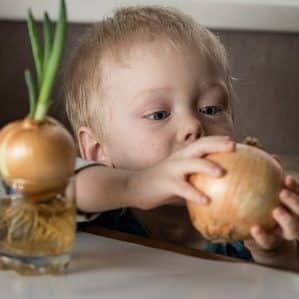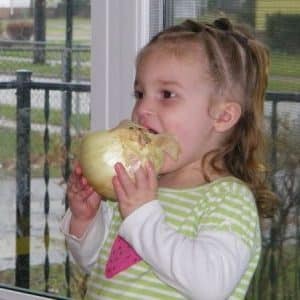Is it possible to give onions to a small child and at what age?
Onions are a healthy and necessary product for the human body. It contains many substances that even small children need for growth and development. But since the vegetable can irritate the digestive system, mothers are afraid to give it to their babies. Doctors confirm benefit onions for the body of children from a certain age.
Chemical composition, nutritional value, vitamins and microelements of onion
This vegetable is rich in vitamins, phytoncides, and carotenoids. It contains flavonoids, essential oil, mono and oligosaccharides, fiber, starch, malic and citric acids.
Vitamins in onions:
- thiamine (B1);
- riboflavin (B2);

- pantothenic acid (B5);
- pyridoxine (B6);
- folic acid (B9);
- vitamin C;
- vitamin E;
- vitamin PP;
- biotin (vitamin H).
Micro- and macroelements:
- iron;
- iodine;
- copper;
- zinc;
- fluorine;
- chromium;
- manganese;
- cobalt;
- nickel;
- magnesium;
- calcium;
- sodium;
- phosphorus;
- potassium;
- sulfur.
Nutritional value per 100 g:
- proteins – 1.4 g;
- fats – 0.2 g;
- carbohydrates – 8.2 g;
- ash – 1 g;
- dietary fiber – 3 g;
- water – 86 g.
Beneficial features

Thanks to a wide range useful properties Onions have proven to be an assistant in treating many diseases and maintaining a healthy lifestyle. This vegetable has restorative, antiviral, antiseptic, antihistamine, anthelmintic, diuretic, hematopoietic, expectorant, tonic, and antiscorbutic properties.
The phytoncides in its composition help destroy tuberculosis and diphtheria bacilli and pathogenic microorganisms.
It is used for cold and influenza, to lower cholesterol and blood sugar, to prevent cardiovascular and cancer diseases, to maintain immunity.
It solves the problems of hypovitaminosis in winter and spring and normalizes sleep, as well as stimulates appetite and normalizes digestive processes.
At what age can you give onions to a child?
Before deciding when children can be given onions, you need to make sure they don't have diseases of the digestive system. It is also recommended to introduce basic vegetable complementary foods first.
Infants can start giving it at 7-8 months. If the child is bottle-fed, it is allowed to introduce the product into the diet from six months.
When can it be introduced into complementary foods?

Onions can be added to a small child's complementary foods only in boiled form. Raw will irritate the baby's mucous membranes stomach. It is better to feed babies red and white varieties - they have less bitterness, and their composition is no different from regular onion. Green onions are also useful. It contains more vitamins B2 and PP, as well as fiber, potassium and magnesium.
Infants can be given the product even before they reach one year of age.
Important! For the first time, other unfamiliar foods should not be introduced into complementary foods at the same time as onions. Otherwise, it will be unclear what reaction this particular vegetable will cause.
How to properly introduce onions into complementary foods
The digestive tract of infants is still imperfect, and the enzymes responsible for digesting food have low activity. That's why Any new product must be introduced into the diet carefully.
Onions are introduced into complementary foods for children, starting with very small pieces (3-4 g), mixed with cereals, meat or other vegetables. You can also give green in the same quantity, adding it to vegetables during cooking. If the baby does not experience any undesirable reactions, the amount can be increased to 10-15 g.
Attention! You should not give onions to babies on an empty stomach.
If a child experiences allergic reactions or intestinal problems, feeding onions should be discontinued.
Why children should not be given onions under a certain age
Each new product that is introduced into complementary foods for babies has its own deadline. This is due to the immaturity of the digestive system of infants. She may be sensitive to unfamiliar foods and react undesirably. Children are not given onions before other vegetables are given.
Even when boiled, this product can damage the delicate mucous membranes of the child’s mouth, esophagus and stomach., if given before the age of 6 months. It can also cause fermentation in the intestines.
Harm of onions for young children

Frequent feeding of onions can cause increased blood pressure and heart rhythm disturbances in babies.
Another undesirable reaction to the product is abdominal pain, gas formation and diarrhea in babies.
In allergic children, the vegetable can provoke an exacerbation of the disease.
In children with bronchial asthma, even the smell of onions can trigger an attack.
Important! There are many folk recipes based on onions. But children are allowed to take such medications only after meals.
Contraindications
You should avoid using the product if your child has diseases of the gastrointestinal tract, liver, kidneys, or heart.
You also need to exclude it from the diet of children who experience poor blood clotting, drowsiness, and decreased muscle tone.
Conclusion
The body of a small child is in dire need of vitamins, minerals and fiber, and onions are a good source of these substances. From the age of six months this product can be introduced into complementary foods for babies. The main thing is to follow the norm that is optimal for the child and give boiled onions. In the absence of contraindications, the baby will receive only benefits.